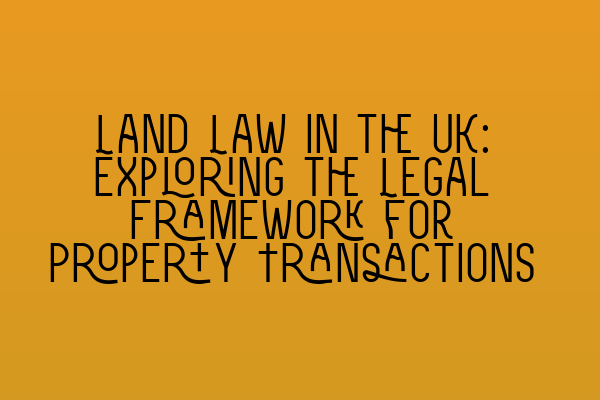Land Law in the UK: Exploring the Legal Framework for Property Transactions
Property transactions are a complex and highly regulated area of law in the UK. Whether you are buying, selling, or leasing a property, understanding the legal framework governing land law is crucial to ensuring a smooth and legally sound transaction. In this article, we will explore the key concepts and principles of land law in the UK.
Freehold and Leasehold
One of the fundamental distinctions in land law is between freehold and leasehold ownership. Freehold ownership grants the owner full and absolute ownership rights over a piece of land or property. This means that the owner has the right to possess, use, and enjoy the property for an indefinite period of time.
On the other hand, leasehold ownership grants the owner (known as the leaseholder) the right to possess and use the property for a fixed period of time, subject to certain conditions and restrictions. This fixed period is typically referred to as the lease term, which can range from a few years to several decades.
Understanding the terms and conditions of a leasehold agreement is essential for both landlords and tenants. Landlords must comply with their obligations, such as maintenance and repair responsibilities, while tenants must adhere to the terms of the lease, including payment of rent and respecting any restrictions imposed.
Conveyancing Process
The conveyancing process is the legal process of transferring the ownership of a property from one party to another. It is highly advisable to seek the assistance of a qualified solicitor to guide you through this process and ensure that all legal requirements are met.
Typically, the conveyancing process involves several steps:
- Offer and Acceptance: The buyer makes an offer to purchase the property, which the seller can accept, reject, or negotiate.
- Pre-Contract Stage: Once the offer is accepted, the solicitors for both parties will carry out various searches and investigations to ensure there are no hidden issues or liabilities associated with the property.
- Contract Exchange: Once both parties are satisfied with the results of the searches and investigations, the contracts are exchanged. At this stage, both parties are legally bound to complete the transaction.
- Completion: On the agreed completion date, the balance of the purchase price is transferred to the seller, and the buyer takes possession of the property.
- Post-Completion: After completion, the solicitor will handle various administrative tasks, including registering the change of ownership with the Land Registry.
Each step of the conveyancing process is crucial, and any mistakes or oversights can have significant legal and financial consequences. Hiring an experienced solicitor can help minimize risks and ensure a successful property transaction.
Land Registry and Title Registration
The Land Registry is the government department responsible for maintaining a register of land and property ownership in England and Wales. When a property is bought or sold, the change in ownership must be registered with the Land Registry.
Title registration provides an official record of the ownership and interests in a property. It also ensures that the ownership is protected against fraud and provides certainty to both buyers and lenders.
As part of the conveyancing process, the solicitor will conduct a title search to confirm the current ownership of the property, any rights or restrictions affecting it, and any mortgages or charges registered against it.
Easements and Covenants
Easements and covenants are important legal concepts that can affect the use and enjoyment of a property.
An easement is a legal right allowing one party to use the land or property of another party for a specific purpose. Common examples include rights of way, drainage rights, and rights to access utility services. Easements can be created through express agreements, implied agreements, or by prescription (through long use).
Covenants, on the other hand, are legally binding promises or agreements that impose obligations on the current and future owners of a property. These obligations can range from restrictions on building or land use to requirements for maintenance and repair. Covenants can also be positive, requiring the owner to take certain actions, such as contributing to the maintenance of shared facilities.
Financing and Mortgages
Property transactions often involve financing through mortgages. A mortgage is a legal agreement between a borrower (the mortgagor) and a lender (the mortgagee) to secure a loan for the purchase or refinancing of a property.
When a mortgage is taken out, the lender typically registers a charge against the property with the Land Registry. This charge gives the lender the right to take possession or sell the property if the borrower defaults on the loan.
Understanding the terms and conditions of a mortgage agreement is crucial, as failure to comply with the conditions can result in severe consequences, including repossession of the property.
Conclusion
Land law is a complex and intricate area of law that governs property transactions in the UK. Whether you are a buyer, seller, landlord, or tenant, having a solid understanding of the legal framework surrounding land law is crucial for a successful and legally sound property transaction.
If you are considering buying or selling a property, it is highly recommended to consult with a qualified solicitor who specializes in property law. They can guide you through the conveyancing process, conduct necessary searches and investigations, and ensure that your rights and interests are protected throughout the transaction.
At SQE Property Law & Land Law, we have a team of experienced solicitors who can assist you with all aspects of property transactions, including conveyancing, lease agreements, and title registrations. Contact us today for a consultation and let us help you navigate the complexities of land law.
Related Articles:
